PROPAGANDA POSTCARDS
(1915)
This page was last updated
25-Oct-2023 07:21

DEM DEUTSCHEN VOLKE!
THE GERMAN PEOPLE
DEUTSCHLANDS SOLL UND HABEN!
GERMANY'S SHOULD AND HAVES!
BACKGROUND: This series of postcards was published by Galerie Verlag G.m.b.H of Berlin. There are ten cards in the series, produced in booklet form, where the cards are attached by perforations. The publication date is unknown, however 1915 is the earliest cancellation date I have seen.
The cards were sold as a small brown booklet bearing the inscription "Dem Deutschen Volk! | Deutschlands Soll und haben! | Herausgegeben von dem Galerie-Verlag G.m.b.H. Berlin W.35, Potsdammerstraβe 97" - 'The German people! | Germany's haves and have nots! | Published by Galerie-Verlag G.m.b.H. Berlin W.35, Potsdammerstraße 97.'

The cards are not numbered so are presented here in the order in which they appear in the booklet from front to back. Each of the 10 cards in this booklet has a different theme, but all are designed to show Germany as a world leader when compared to Britain and France, Germany's proncipal enemies.
The purpose of these cards is entirely politicially morivated and would have been a way to galvanise and rally the German people in the early days of the First World War. The message was "We are in the right, our enemies are in the wrong, their attempts to shackle us and deprive us of what we deserve will not succeed".
The reverse side of each postcard has part of a poem that reds "Unity and justice and freedom for the German fatherland, after which we all strive to be fraternal with our hearts and hands!"

The poem was written by August Heinrich Hoffmann von Fallersleben (1798-1874), a German poet best known for "Das Lied der Deutschen", the song of the German's, the third stanza of which is now the German National Anthem.

FRONT COVER FRONT & REVERSE
The front side of the booklet bears the inscription "Dem Deutschen Volke! | Deutschlands Soll und haben! | Herausgegeben von dem Galerie-Verlag G.m.b.H. Berlin W.35, Potsdammerstraβe 97"'To the German people! | Germany's haves and have nots! | Published by Galerie-Verlag G.m.b.H. Berlin W.35, Potsdammerstraße 97.'
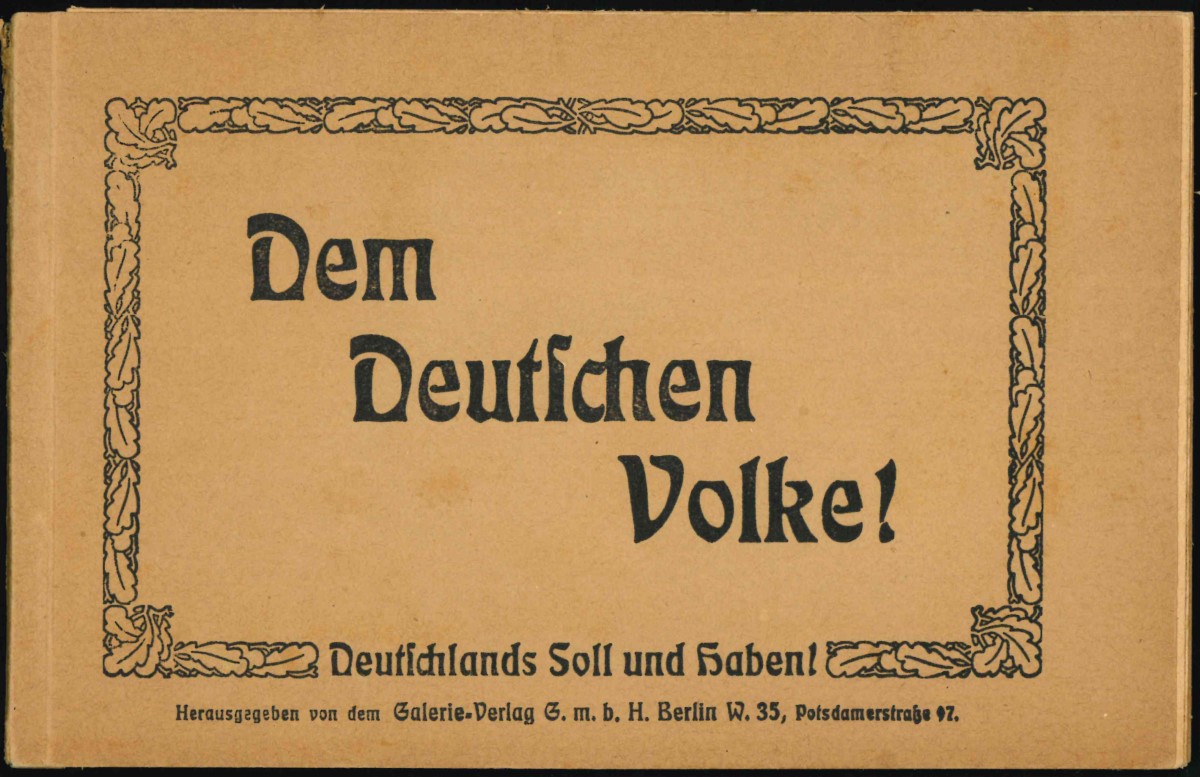
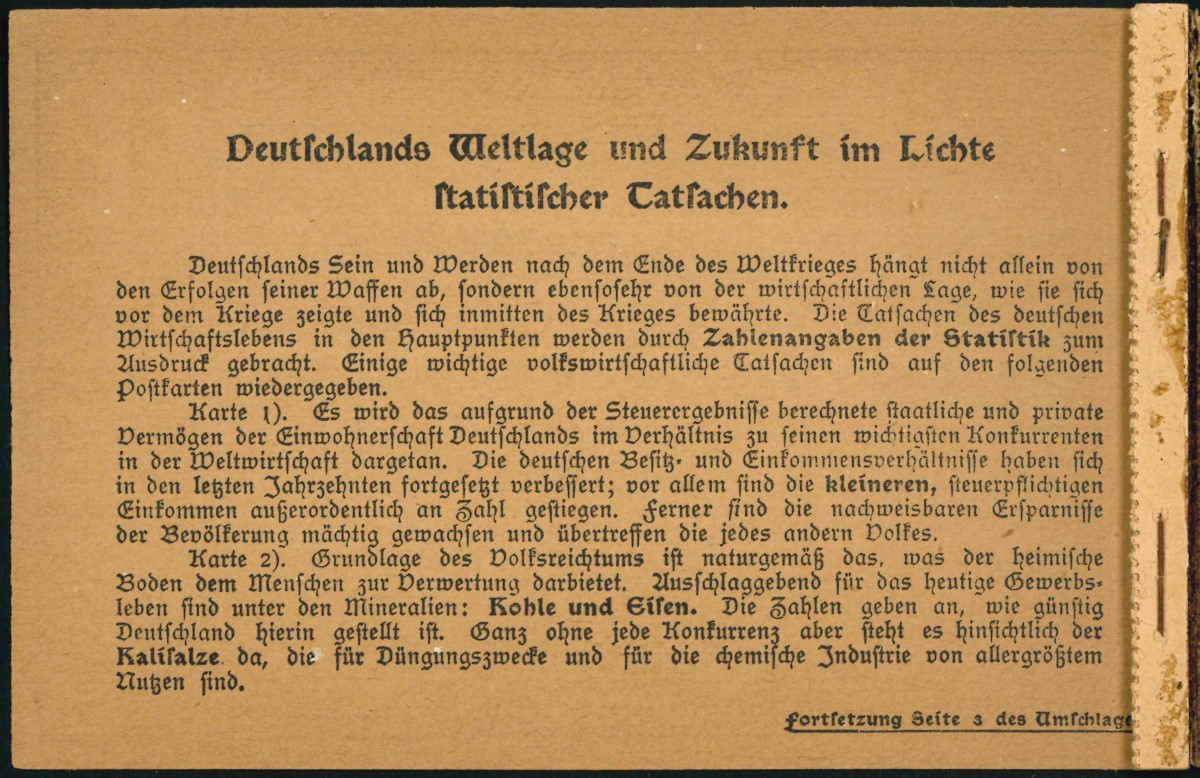

The reverse side contains an overall description of the series as well as a description of the first and second cards in the series and translates as:
"Germany's world situation and future in the light of political issues."
"Germany's being and becoming after the end of the world war does not depend solely on the success of its weapons, but just as much on the economic situation as it appeared before the war and as it proved in the midst of the war. The main points of the facts of German economic life are expressed through statistical figures. Some important economic facts are reflected in the following postcards."
"Card 1: The state and private wealth of Germany's population, calculated based on tax results, is presented in relation to its most important competitors in the global economy. German property and income conditions have continued to improve in recent decades. Above all, the number of smaller, taxable incomes has increased enormously. Furthermore, the population's demonstrable savings have grown enormously and exceed those of any other people."
"Card 2: The basis of national wealth is naturally what the local soil offers people for use. Crucial for today's. Life can be found among the minerals: Coal and Iron. The numbers show how favourably Germany is in this regard. However, there is no competition at all when it comes to potash tools. There, which is of greatest importance for fertilisation purposes and for the chemical industry."

CARD 1
VOLKSWOHLSTAND VOR DEN KRIEGE
PEOPLE'S PROSPERITY BEFORE THE WAR
"Card 1: The state and private wealth of Germany's population, calculated based on tax results, is presented in relation to its most important competitors in the global economy. German property and income conditions have continued to improve in recent decades. Above all, the number of smaller, taxable incomes has increased enormously. Furthermore, the population's demonstrable savings have grown enormously and exceed those of any other people."
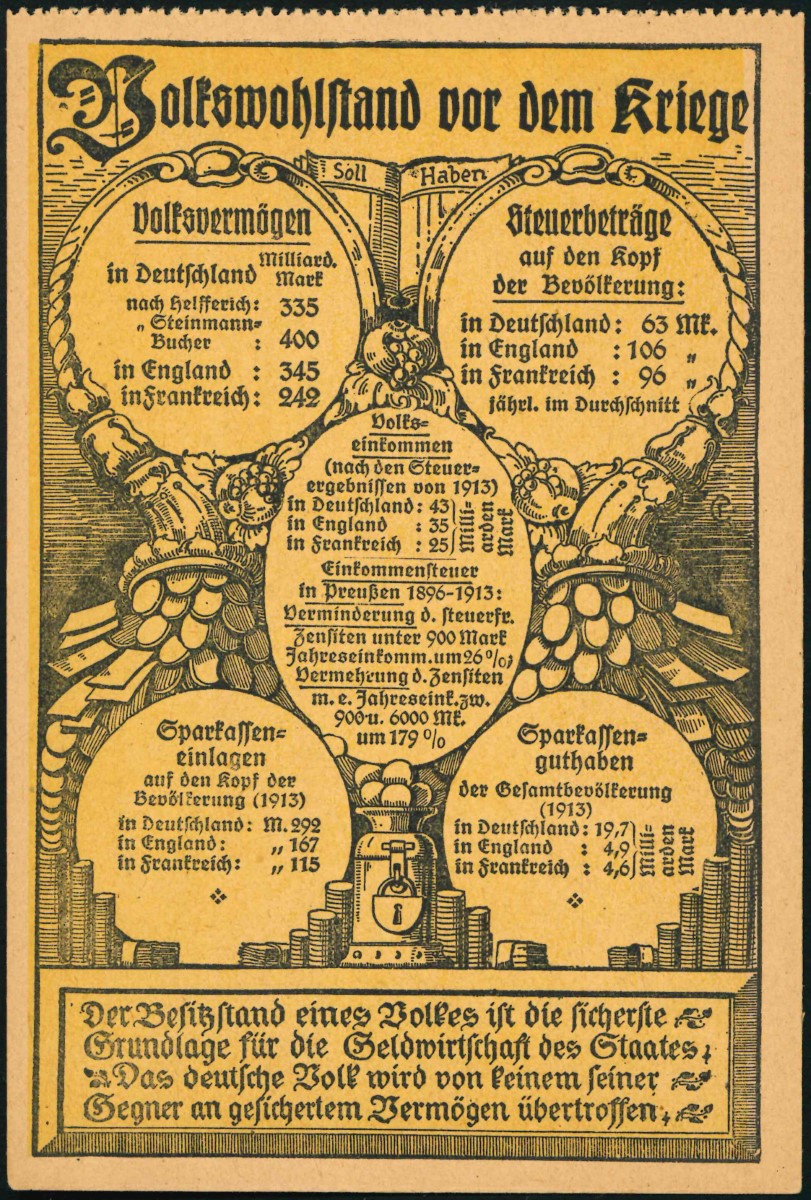
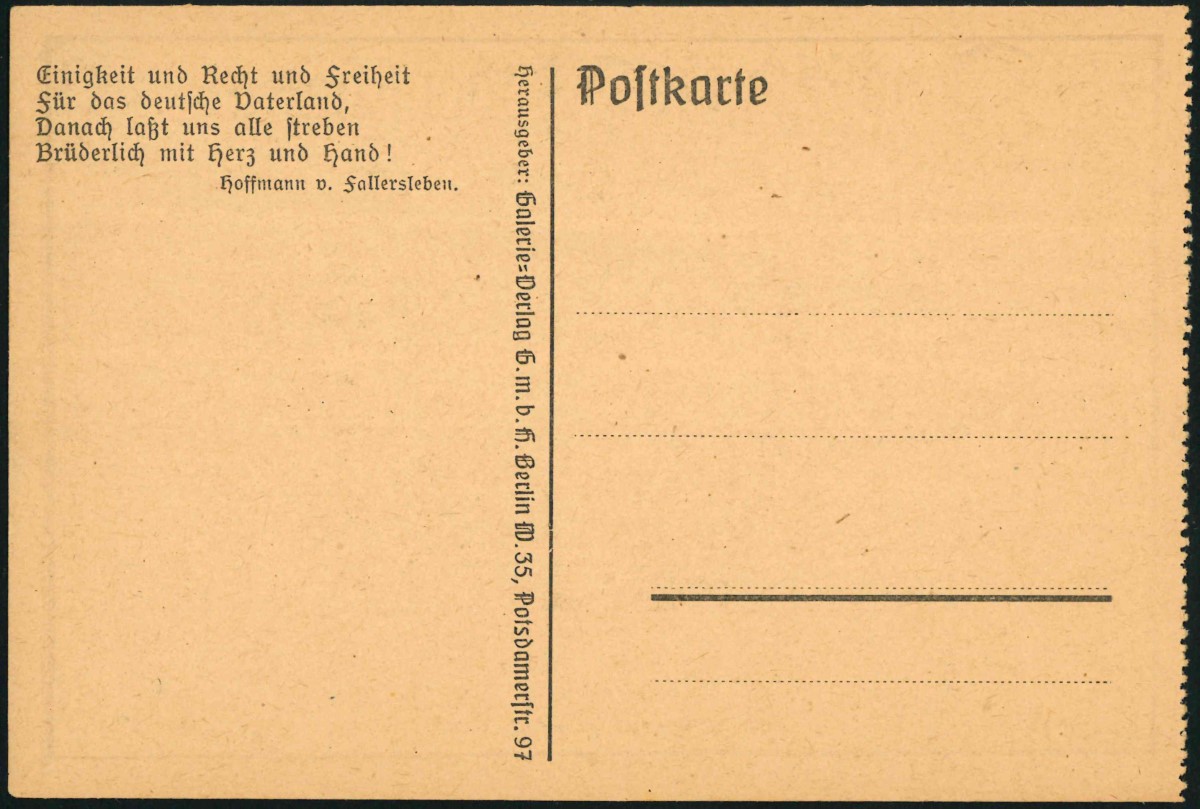

The five bubbles top left to bottom right compare National Wealth, tax per capita, indiviual income, savings bank deposits and savings bank balances for Germany, Britain and France.
The box at the bottom of the card reads "The property status of a people is the safest basis for the state's agricultural economy - the German people are unrivaled by any of their opponents in terms of secure wealth"

CARD 2
DEUTSCHLANDS BODENSCHÄTZE
GERMANY'S NATURAL TREASURES
"Card 2: The basis of national wealth is naturally what the local soil offers people for use. Crucial for today's. Life can be found among the minerals: Coal and Iron. The numbers show how favourably Germany is in this regard. However, there is no competition at all when it comes to potash tools. There, which is of greatest importance for fertilisation purposes and for the chemical industry."
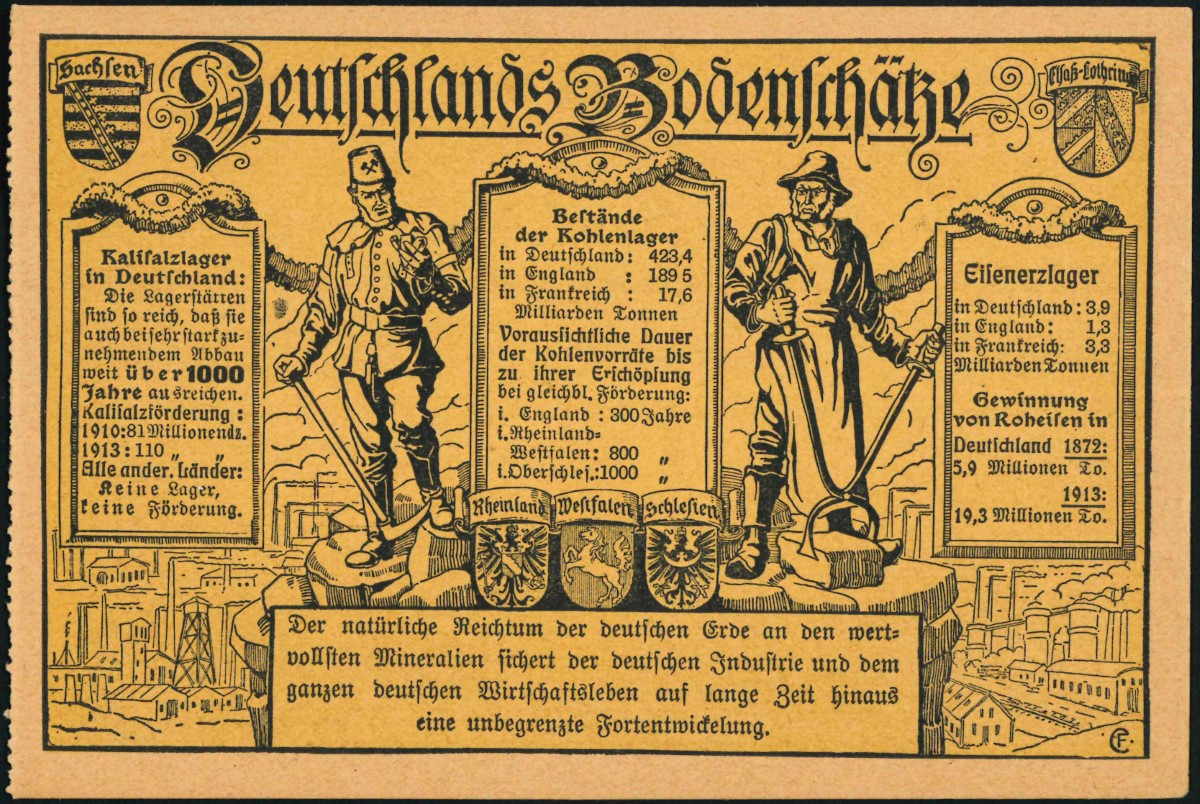
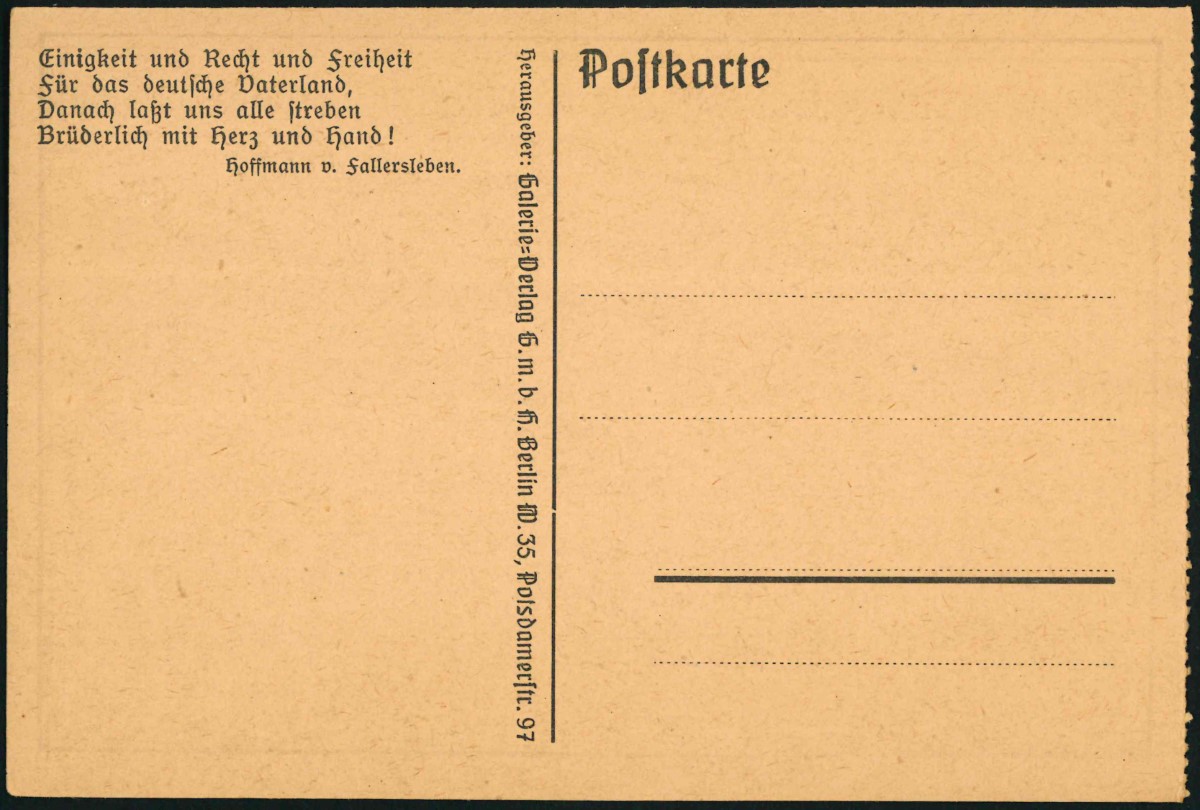


CARD 3
DER GEWERBLICHE AUFSCHWUNG DEUTSCHLANDS IST UNAUSHALTSAM
GERMANY'S COMMERCIAL BOOM IS UNSTOPPABLE
Card 3: In addition to the treasures of land, the work that is constantly carried out by a people also has to be taken into account for the financial situation of a people. In Germany, one of the most important areas of work is industry. Their growth is illustrated by the figures. The chemical factories in which the foreign state is equal to us are particularly flourishing.
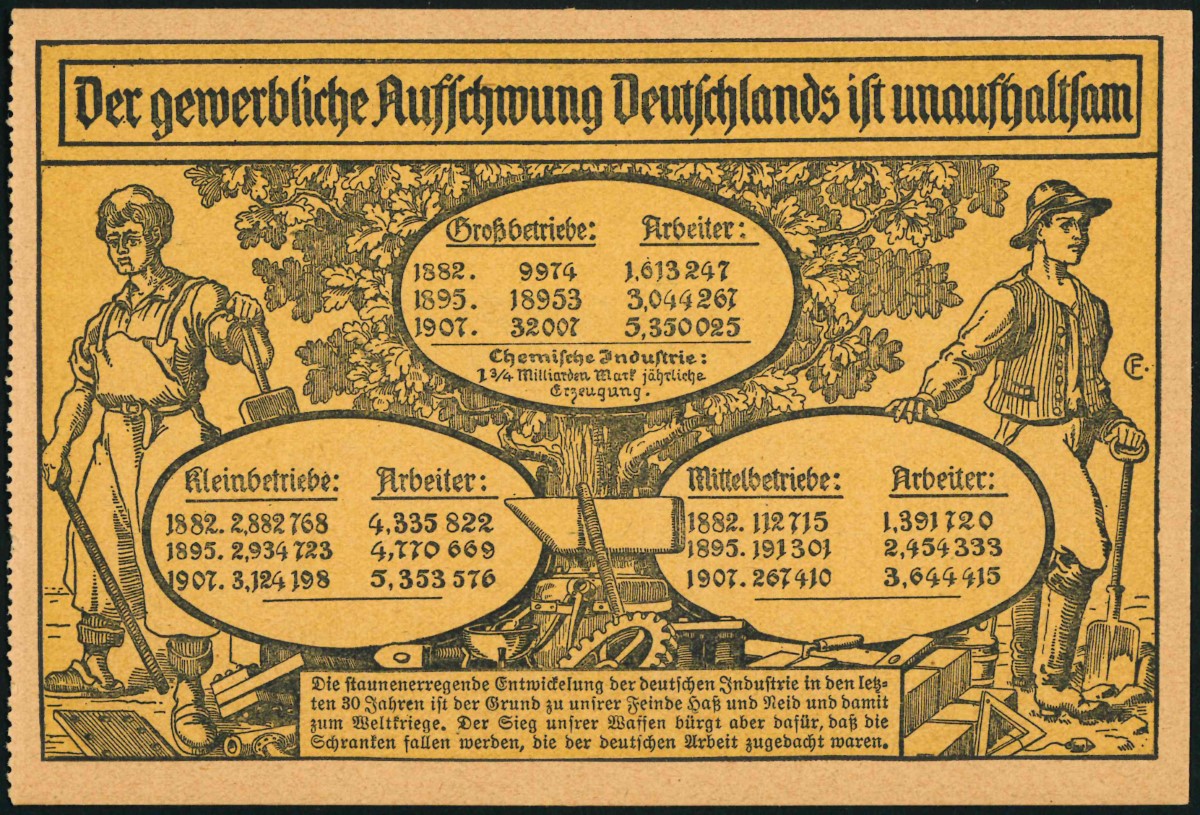
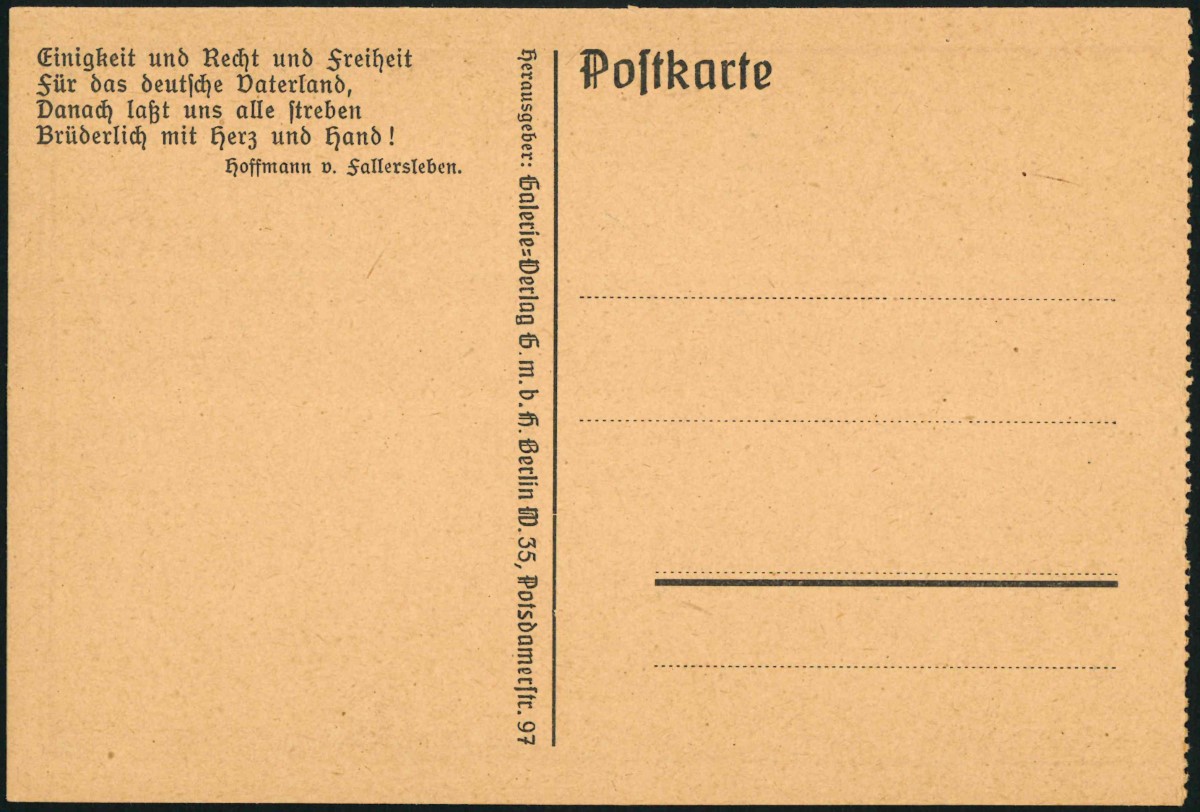


CARD 4
DEUTSCHLANDS HANDEL UND VERKEHR
GERMANY'S TRADE & TRANSPORT
Card 4: But the prosperity of an extensive industry also requires a significant and extensive trade and diverse transport options. The most important modern means of transport, the Eifen railways, was developed most magnificently in all of Europe by Germany, and the results of foreign trade are significant for shipping. With regard to the latter, Germany has in a very short time almost equaled England's old trade in monetary value; their proportionate increase already significantly exceeds that of England.
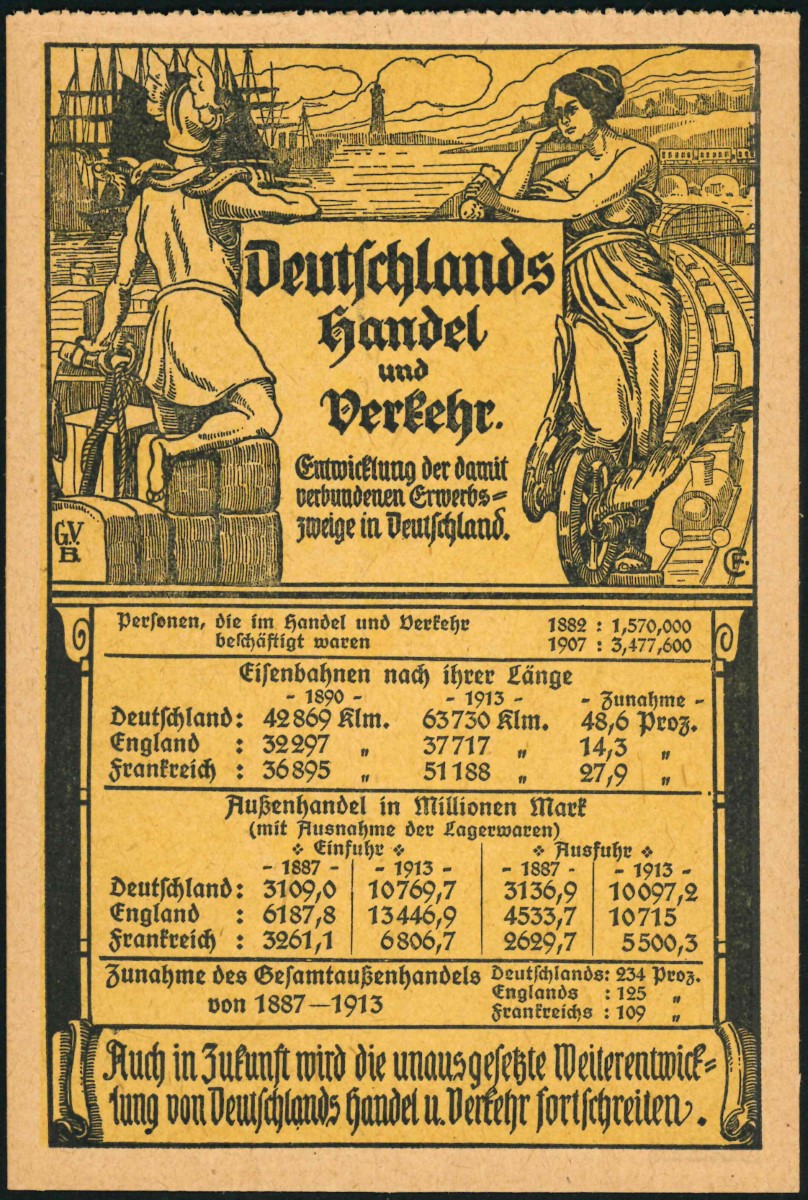
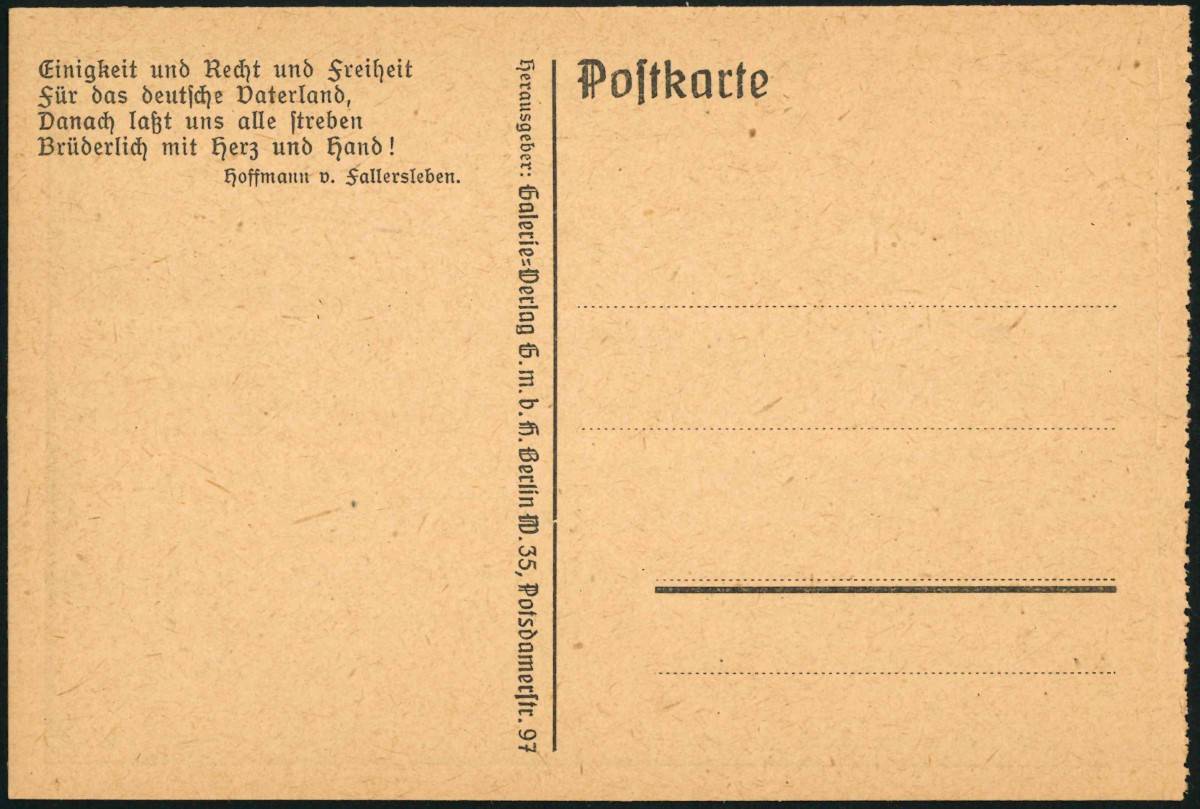


CARD 5
DEUTSCHLANDS ACKERBAU VIEHZUCHT
GERMANY'S AGRICULTURE LIFESTOCK BREEDING
Card 5: The oldest agricultural work is agriculture, which is divided into arable farming and livestock breeding. Fortunately, the rapid decline in the agricultural labor force was almost offset by the enormous increase in crop yields and by the impressive successes of rational livestock breeding, which gave the German people a good start. had allowed moderately copious meat confumation.
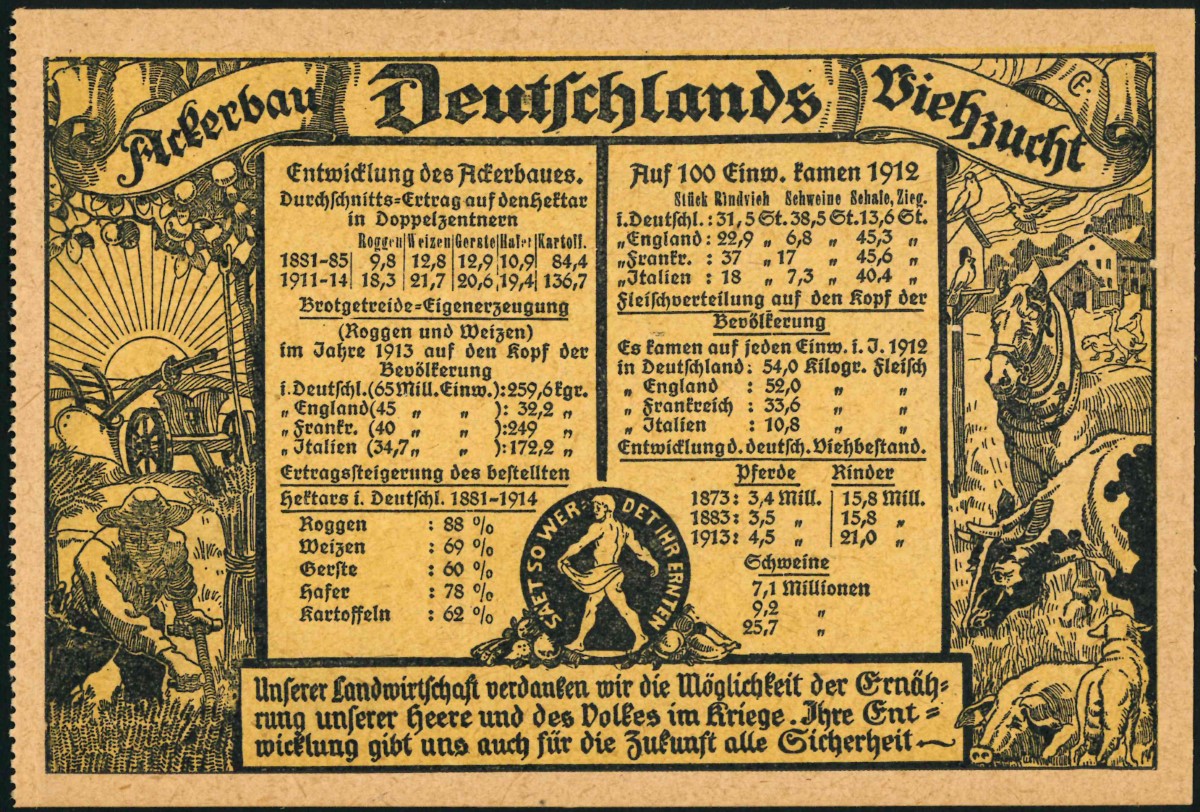
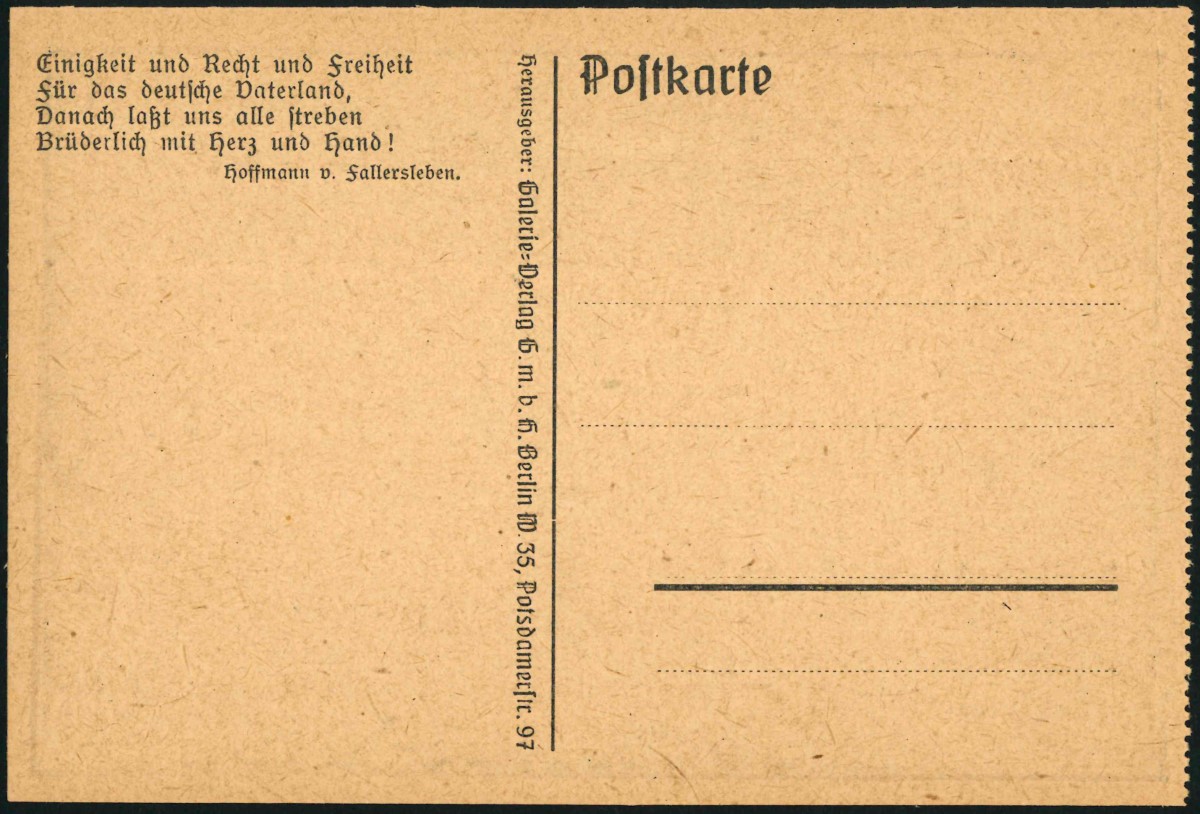


CARD 6
RÜSTUNGSAUSGABEN
ARMS EXPENDITURE
Card 6: The huge costs that the war has caused us need not discourage us, because we will certainly remain competitive in the world economy. We must not forget that war imposes burdens on our enemies that are as heavy or even heavier than those on us, as were the previous armaments.
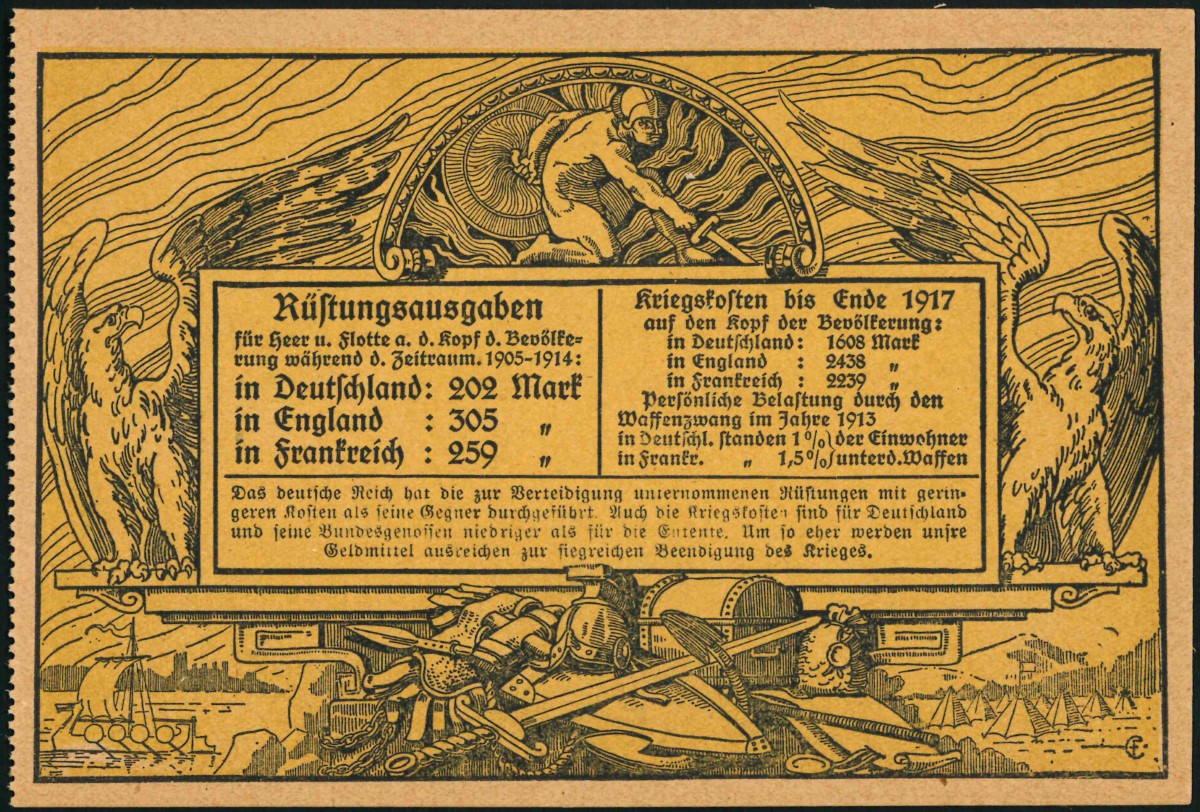
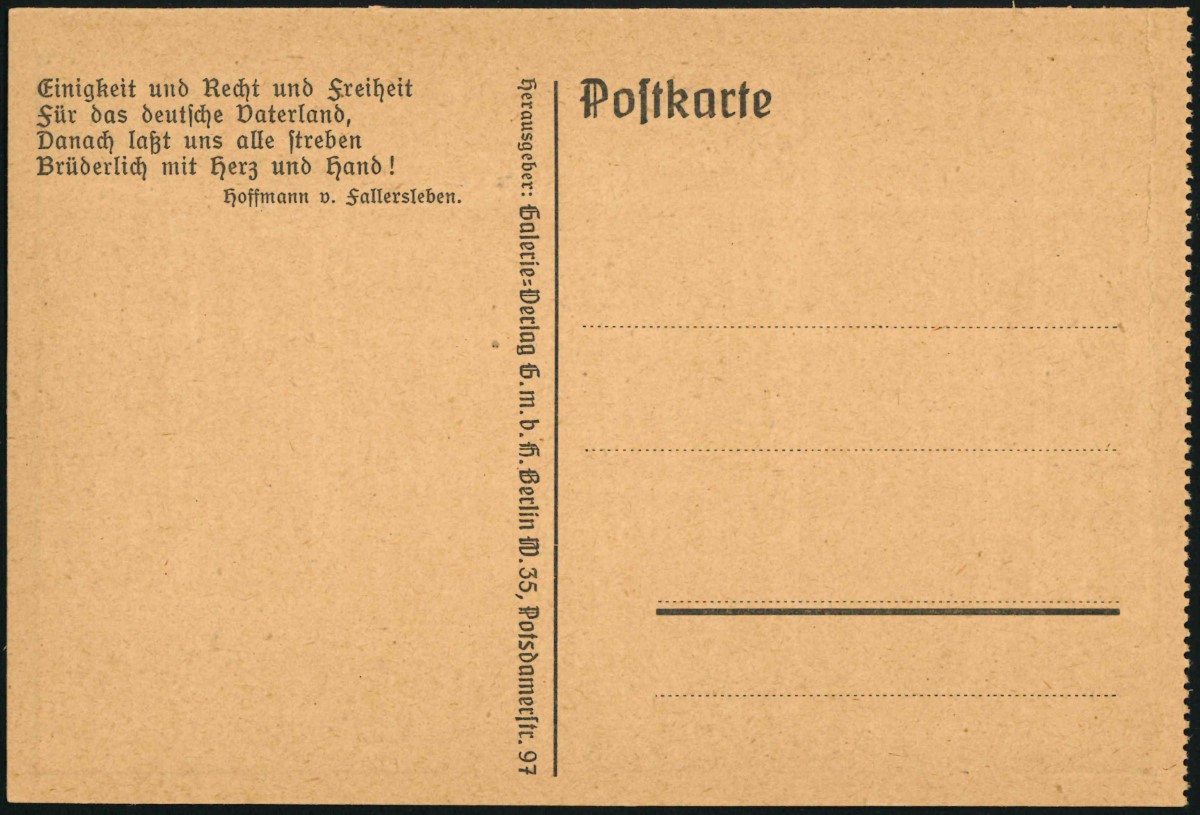


CARD 7
DAS REICHS FÜRSORGE FÜR DIE ARBEITENDE BEVÖLKERUNG
THE EMPIRE CARES FOR THE WORKING POPULATION
Card 7: despite the “Militarism" brought less money to the German Empire than to our main enemies has achieved a position among all peoples, is without a doubt one of the foundations for the amazing successes of German weapons. Germany has the lowest number of illiterate people, but the highest government spending on school purposes, which is successful. the richest flowering of universities and a book production that far exceeds all other countries.
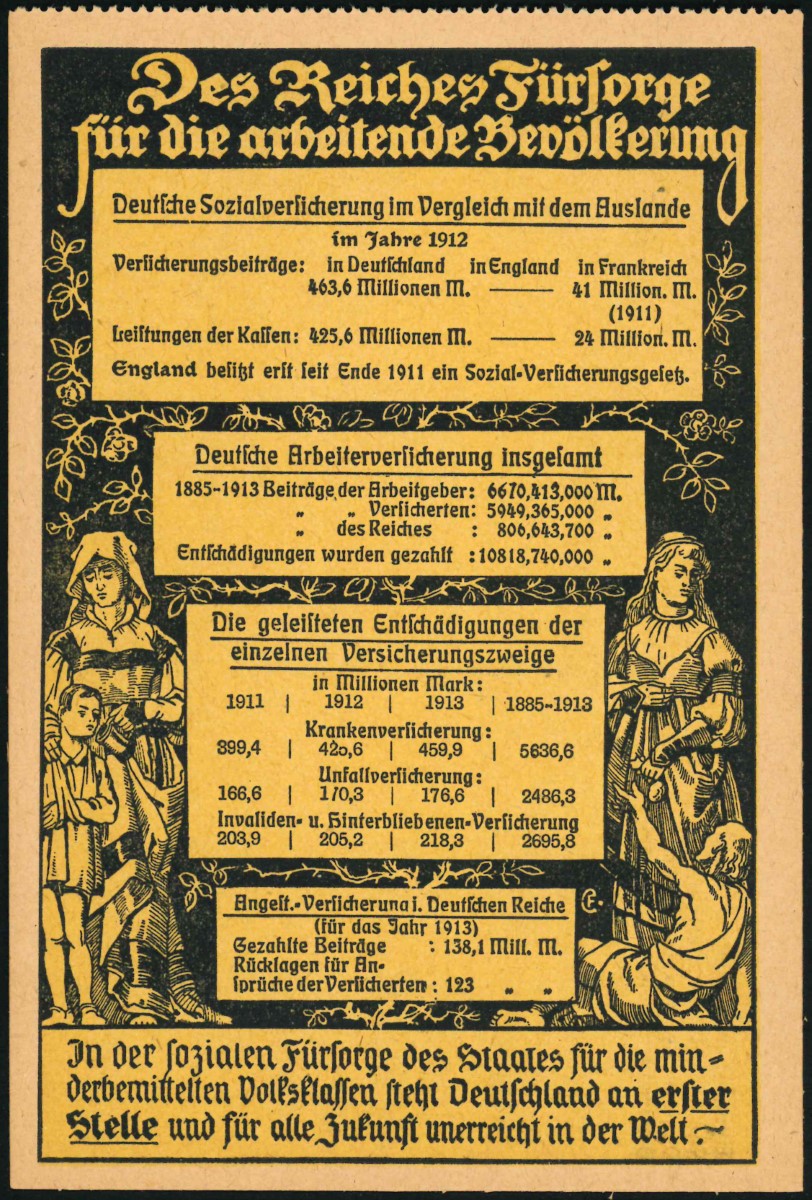
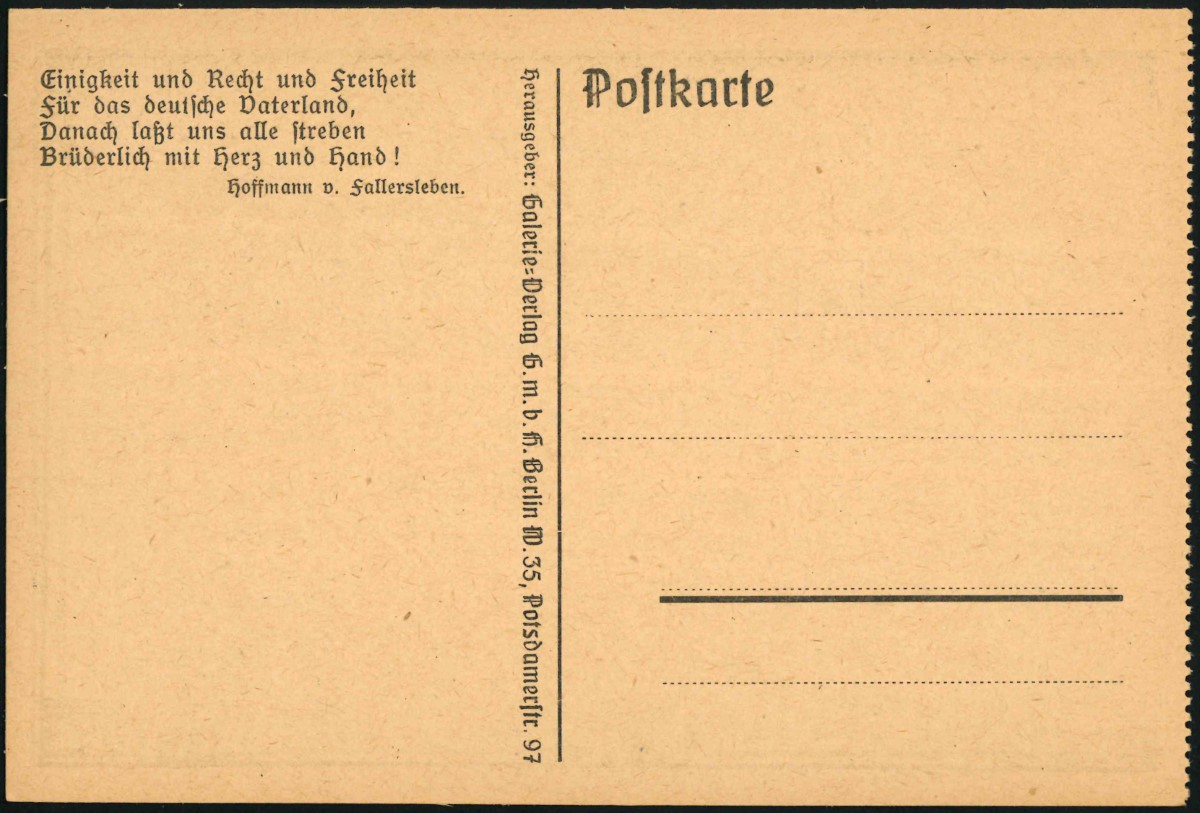


CARD 8
DEUTSCHLAND STEHT IN DER KULTUR AN ERSTER STELLE
GERMANY IS FIRST IN CULTURE
The title of this card is "Germany ranks first in reputation"
Card 8: In Germany, people not only value education, but also the sum of intelligence and manpower that lies within the people. Hence the great social support for the less fortunate. Huge sums of money are spent on this every year. No country in the world has similarly extensive social legislation for the working population. It should not be ignored that the employers and the Reich itself bear the larger share of the insurance costs compared to the insured.

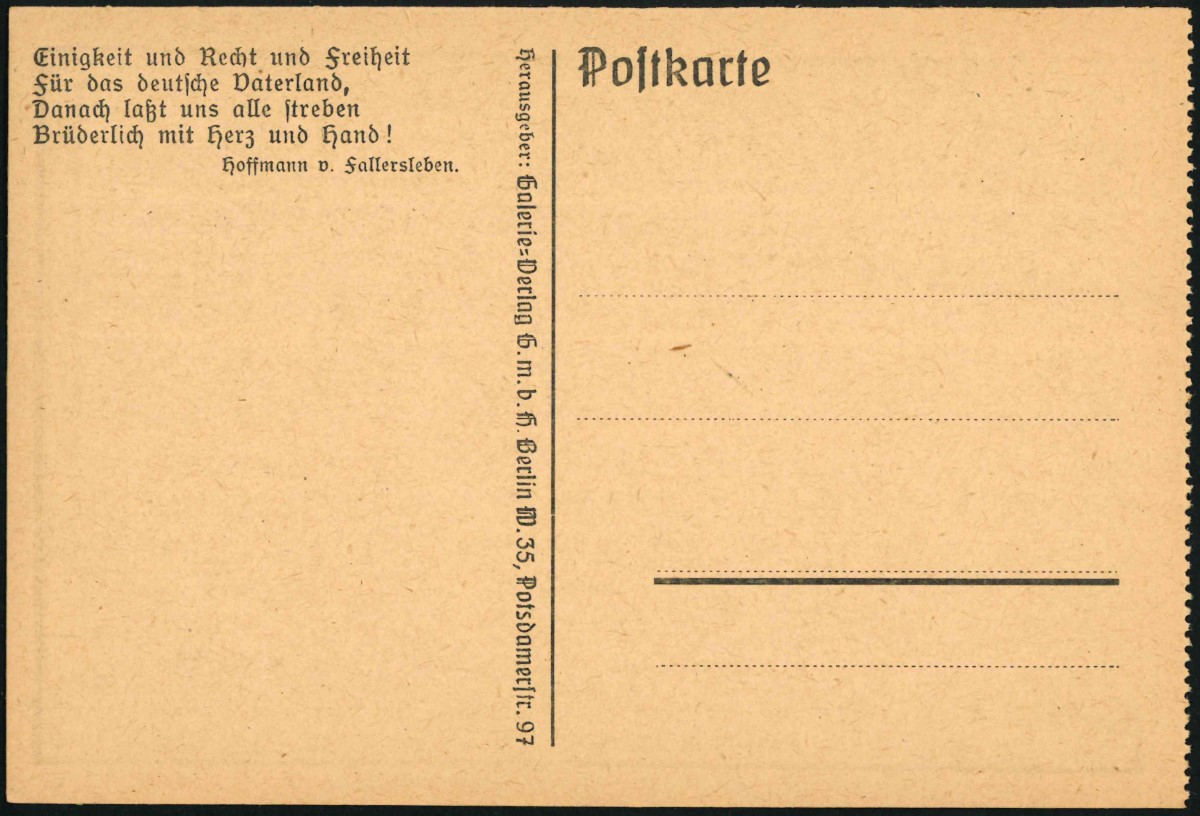


CARD 9
UNSERE KREIGSERFOLGE
OUR WAR SUCCESS
Card 9: If the economic conditions before the war give every German the right to look confidently into the future, especially the events of the war itself. Which people achieved similar successes in the World War as the Germans? Sooner or later these successes must lead to a peace that at least guarantees us the freedom of our working lives and the development of our areas of work.
The box in the centre of the postcard reads "Our war successes include rejection of the German peace offer of December 12th 1916. "
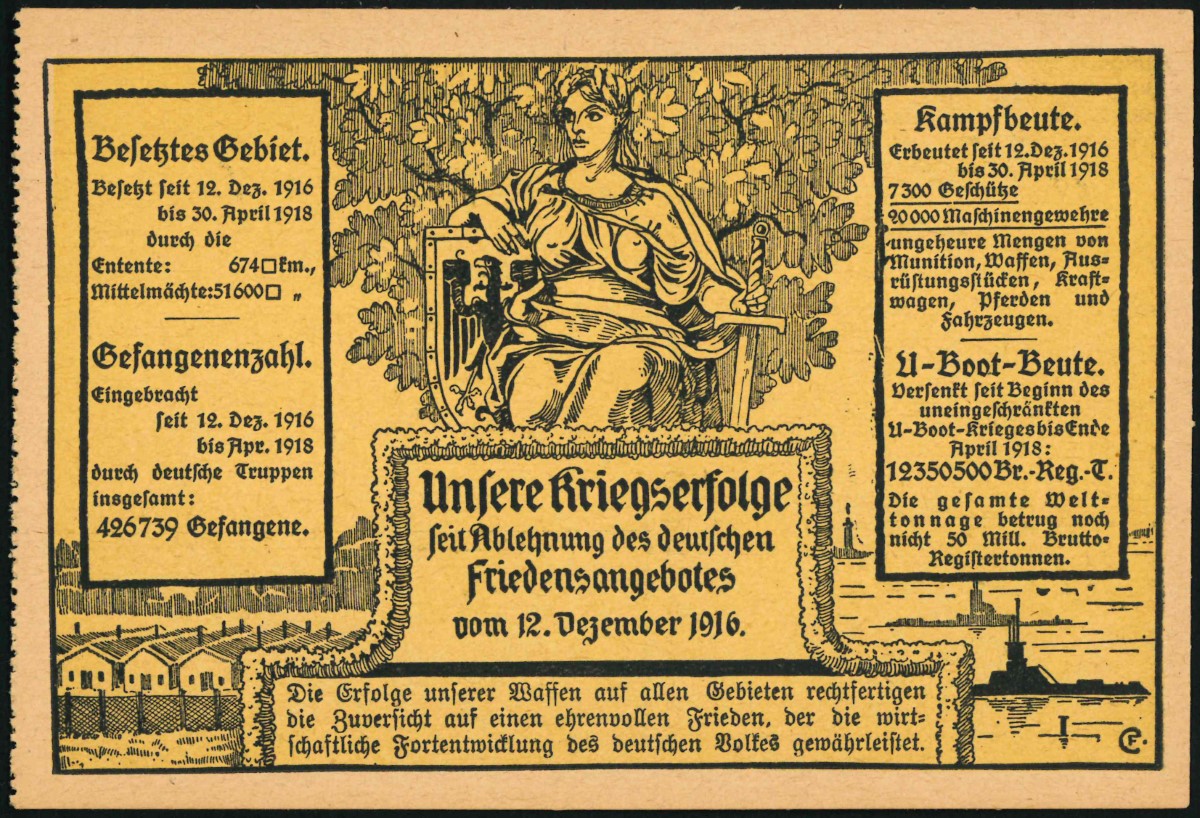
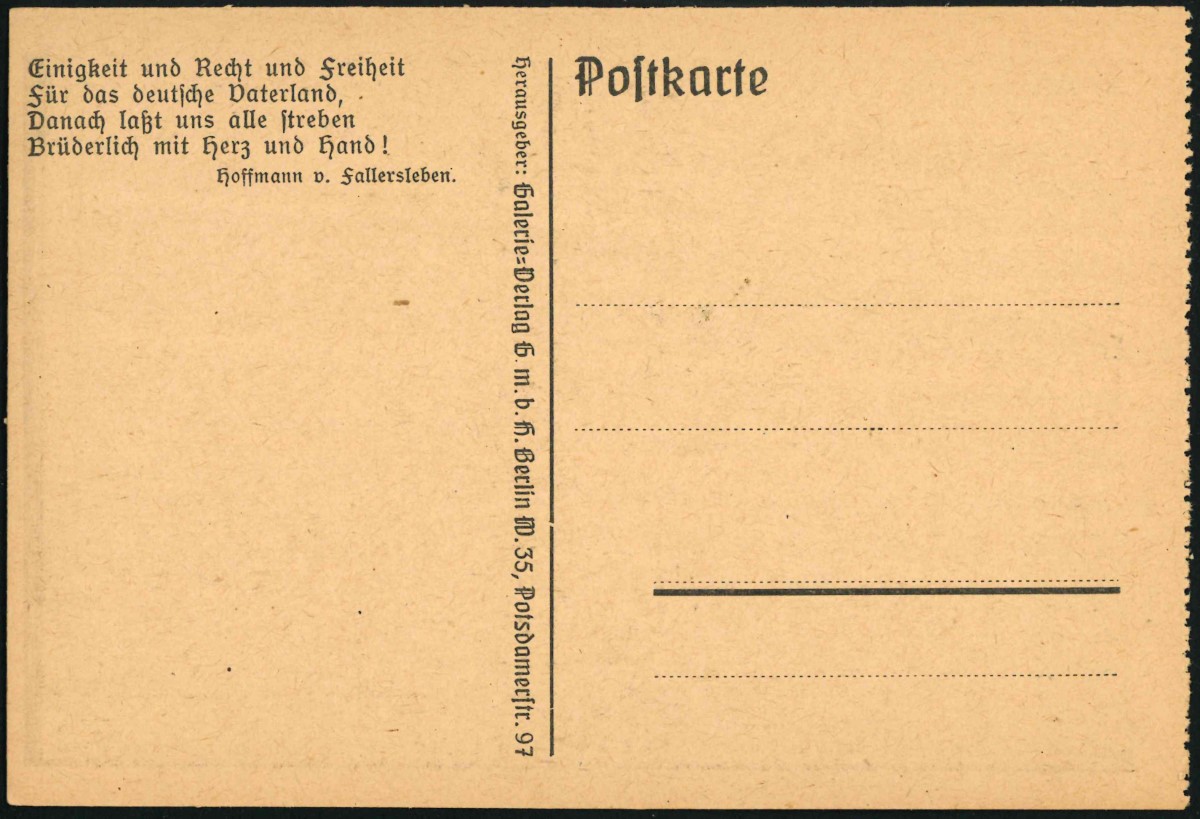


CARD 10
WAS WIR WOLLEN WAS WIR HABEN!
WHAT WE WANT WHAT WE HAVE!
Card 10: But our enemies have become too entrenched in their hatred of Germans and are still hoping for the complete humiliation of Germany and its allies. And yet, how ridiculous does this arrogance, this lie of phraseology, appear when one compares the results of the war so far on the German and enemy sides numerically! Can there be a better-founded call for steadfast confidence for the German people than such a comparison of what we won and what we won in the world wars? She writes in bright years on the flag of our future: Victory must remain with us!
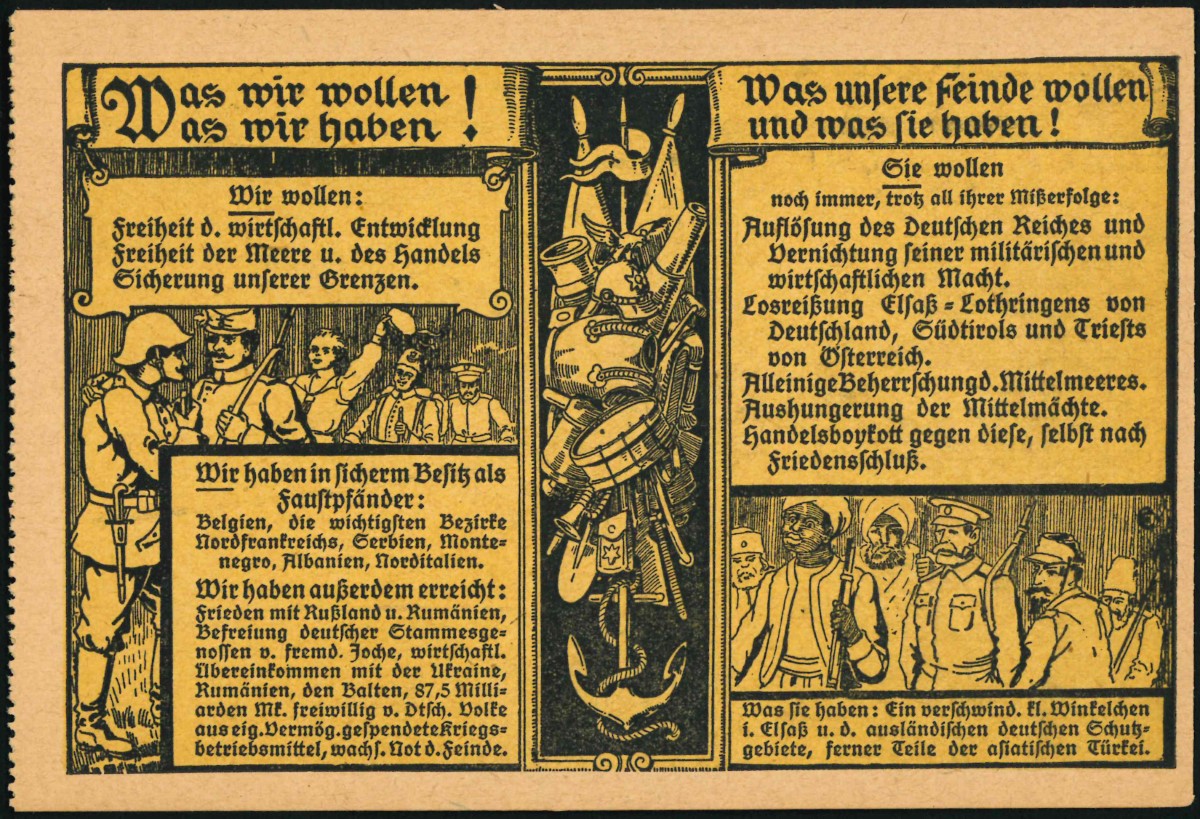
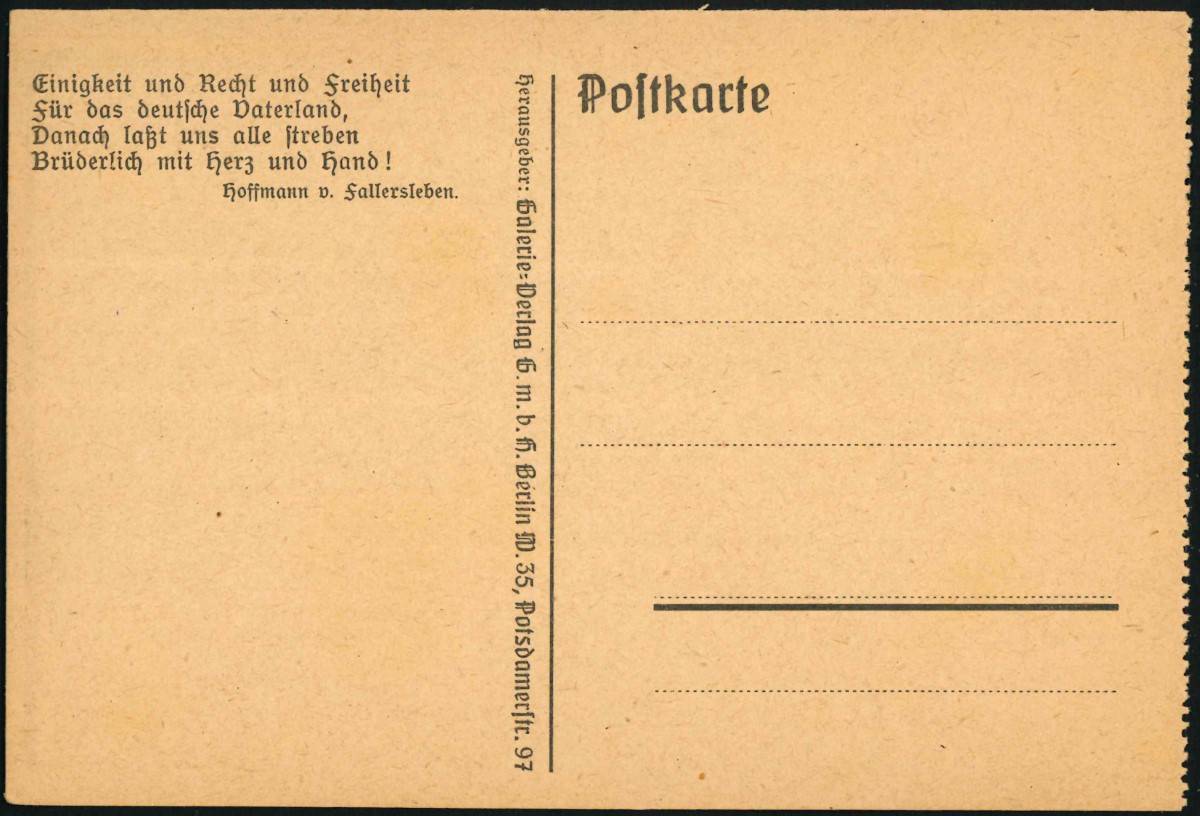


BACK COVER INSIDE & BACK
The inside cover provides details of cards 3 to 6 as follows:"Card 3: In addition to the treasures of land, the work that is constantly carried out by a people also has to be taken into account for the financial situation of a people. In Germany, one of the most important areas of work is industry. Their growth is illustrated by the figures. The chemical factories in which the foreign state is equal to us are particularly flourishing.
"Card 4: But the prosperity of an extensive industry also requires a significant and extensive trade and diverse transport options. The most important modern means of transport, the Eifen railways, was developed most magnificently in all of Europe by Germany, and the results of foreign trade are significant for shipping. With regard to the latter, Germany has in a very short time almost equaled England's old trade in monetary value; their proportionate increase already significantly exceeds that of England.
"Card 5: The oldest agricultural work is agriculture, which is divided into arable farming and livestock breeding. Fortunately, the rapid decline in the agricultural labor force was almost offset by the enormous increase in crop yields and by the impressive successes of rational livestock breeding, which gave the German people a good start. had allowed moderately copious meat confumation.
"Card 6: The huge costs that the war has caused us need not discourage us, because we will certainly remain competitive in the world economy. We must not forget that war imposes burdens on our enemies that are as heavy or even heavier than those on us, as were the previous armaments.
"Card 7: despite the “Militarism" brought less money to the German Empire than to our main enemies
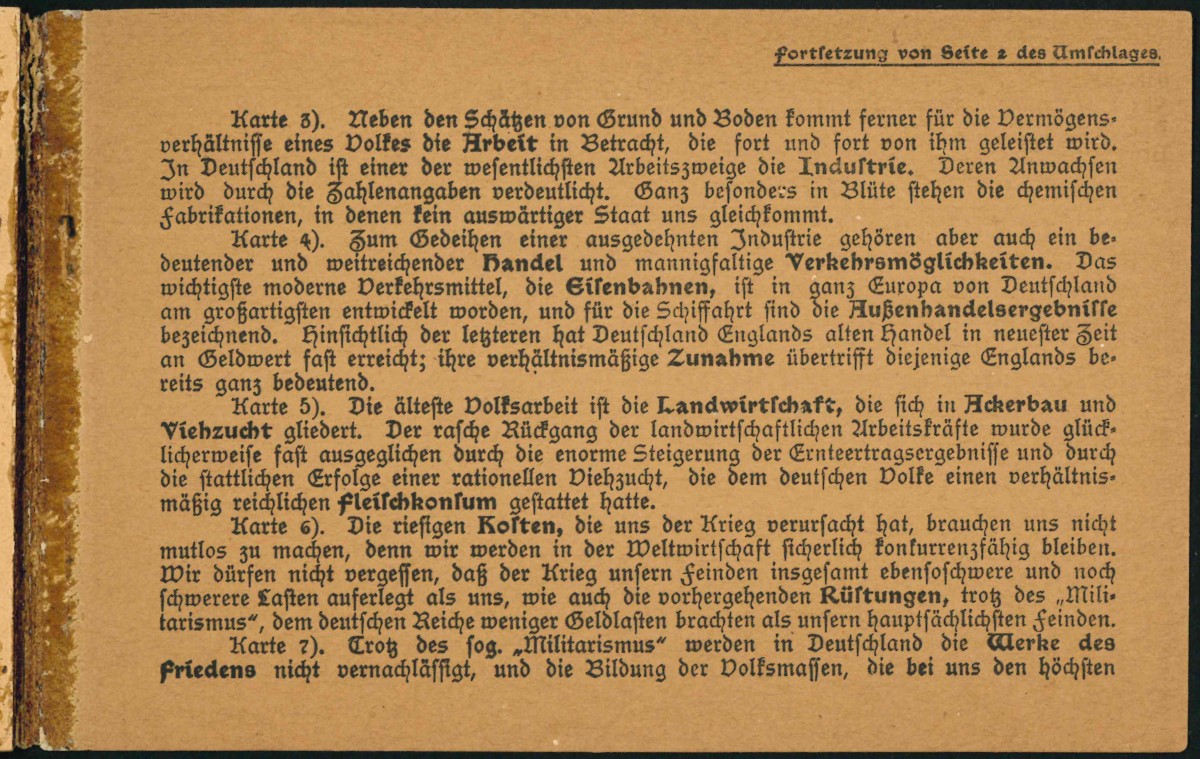
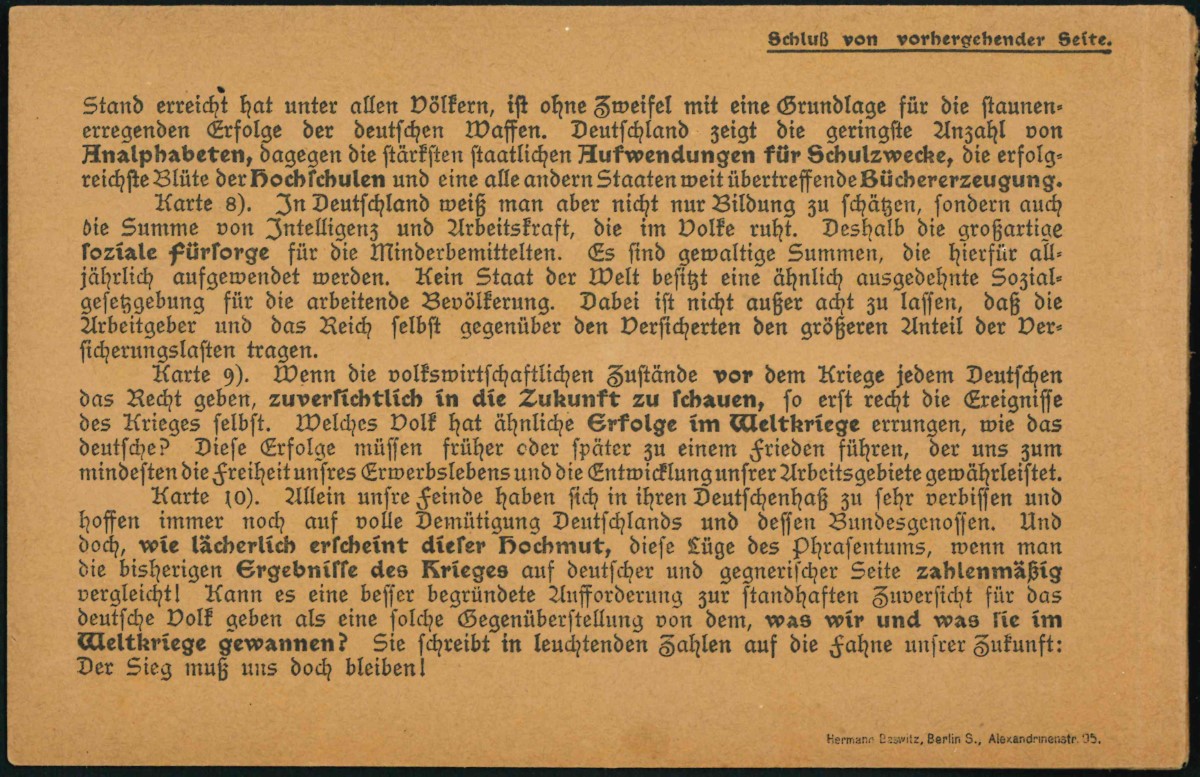

Description on outside reverse cover reads:
Continued from previous page:
has achieved a position among all peoples, is without a doubt one of the foundations for the amazing successes of German weapons. Germany has the lowest number of illiterate people, but the highest government spending on school purposes, which is successful. the richest flowering of universities and a book production that far exceeds all other countries.
"Card 8: In Germany, people not only value education, but also the sum of intelligence and manpower that lies within the people. Hence the great social support for the less fortunate. Huge sums of money are spent on this every year. No country in the world has similarly extensive social legislation for the working population. It should not be ignored that the employers and the Reich itself bear the larger share of the insurance costs compared to the insured.
"Card 9: If the economic conditions before the war give every German the right to look confidently into the future, especially the events of the war itself. Which people achieved similar successes in the World War as the Germans? Sooner or later these successes must lead to a peace that at least guarantees us the freedom of our working lives and the development of our areas of work.
"Card 10: But our enemies have become too entrenched in their hatred of Germans and are still hoping for the complete humiliation of Germany and its allies. And yet, how ridiculous does this arrogance, this lie of phraseology, appear when one compares the results of the war so far on the German and enemy sides numerically! Can there be a better-founded call for steadfast confidence for the German people than such a comparison of what we won and what we won in the world wars? She writes in bright years on the flag of our future: Victory must remain with us!


